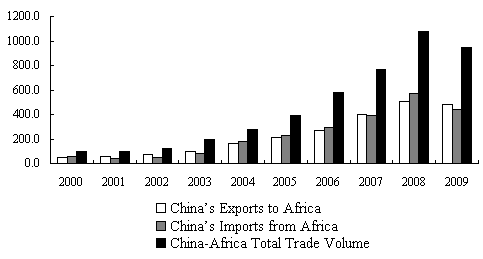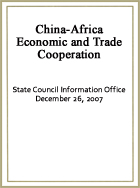China-Africa Economic and Trade Cooperation
China Development Gateway, December 24, 2010 Adjust font size:
I.Promoting Balanced Development of Trade
Trade was the earliest form of China-Africa economic and trade cooperation. With the development of China-Africa relations and increased exchanges between China and African countries, the scale of China-Africa trade has increasingly expanded. China-Africa bilateral trade volume was only US$12.14 million in 1950, it rose to US$100 million in 1960, and exceeded US$1 billion in 1980. After reaching the US$10 billion mark in 2000, China-Africa trade has maintained a momentum of rapid growth ever since. In 2008, China-Africa bilateral trade volume exceeded US$100 billion, of which US$50.8 billion is China's exports to Africa and US$56 billion is imports from Africa. The average annual growth rate of China-Africa trade between 2000 and 2008 reached 33.5%, with its proportion in China's total foreign trade volume rising from 2.2% to 4.2%, and its proportion in Africa's total foreign trade volume increasing from 3.8% to 10.4%. Although China-Africa trade volume dropped to US$91.07 billion in 2009 as a result of the international financial crisis, China became Africa' s largest trade partner that year for the first time. As the global economy recovered, China-Africa trade also maintained a favorable recovery and development momentum. From January to November in 2010, China-Africa trade volume reached US$114.81 billion, a year-on-year growth of 43.5%.
![]()

With the expansion in the scale of trade, the China-Africa trade structure has been gradually optimized, and advantageous products have successively entered each other's market. During the 1980s and 1990s, China's exports to Africa were mainly light industrial products, food, chemical products, native produce and animal by-products. Since 2000, the export of machinery, automobiles and electronic items has been dramatically increasing, with product quality and technology markedly improved. Currently, the proportion of machinery and electronic products accounts for more than half of China's exports to Africa. Africa's major export products to China used to be cotton and phosphate, among other primary products. In recent years, steel, cop-per, chemical fertilizers and electronic items produced in Africa have successively entered China's market. In addition, Africa's export of agricultural products to China has been increasing rapidly. Local specialties such as oranges from Egypt, wine from South Africa, cocoa beans from Ghana, coffee from Uganda, olive oil from Tunisia and sesame from Ethiopia have become familiar to and popular among Chinese consumers. Because of the impact of the international financial crisis, China saw its imports from Africa dropped in 2009, but import of agricultural products increased by 25%.
Following the principle of mutual benefit and reciprocity, China has been promoting trade facilitation, and all-round, comprehensive and balanced China-Africa trade for years. China has signed bilateral trade agreements with 45 African countries, and enhanced cooperation in customs, taxation, inspection and quarantine, so as to create favorable conditions for China-Africa trade development. In support of African countries' export expansion to China, the latter has offered the Least Developed Countries (LDCs) of Africa that have diplomatic relations with China zero tariffs on some of their exports to China since 2005. By July 2010, African products that enjoy zero-tariff treatment had increased to 4,700 taxable items, and are expected to cover 95% of the total taxable items mentioned in the Regulations of the People's Republic of China on Import and Export Duties. Thanks to this zero-tariff policy, the export of African products to China that are free from Chinese customs duties has been growing rapidly. From 2005 to the end of June 2010, China had imported African products with an accumulated value of US$1.32 billion under zero-tariff terms, including agricultural products, leather, stone materials, textiles and garments, machine spare parts, base metals and wood products. China has also been helping African enterprises enter the Chinese market by holding African commodity exhibitions, establishing African products exhibition centers, and offering free stalls or reducing stall rents and other preferential terms.
Now China and Africa are both in the process of industrialization and urbanization, a time characteristic of great market demand, hence China-Africa trade has great potential. For China, Africa's exports of crude oil, minerals, steel and agricultural products plays an active role in promoting China's economic development and improving the Chinese people' s livelihood. For Africa, China's products and technology meet the need of Africa's development, while the vast Chinese market provides wide space for African products. Especially, China's continued rapid economic growth has created a stable export market for Africa's resource products. Similarly, good-quality and reasonably-priced Chinese commodities entering Africa help to improve African people's standard of living and help some African countries to constrain and relieve inflation.


